- Home
- Julia Quinn
The Duke and I Page 7
The Duke and I Read online
Page 7
“Well,” Posy continued, “I must say, I was rather mature about the entire encounter. I let her say what she wished, and then I bid her goodbye. And then I had the most amazing realization.”
“What is that?”
Posy gave a smile. “I like myself.”
“Well, of course you do,” Sophie said, blinking with confusion.
“No, no, you don’t understand,” Posy said. It was strange, because Sophie ought to have understood perfectly. She was the only person in the world who knew what it meant to live as Araminta’s unfavored child. But there was something so sunny about Sophie. There always had been. Even when Araminta treated her as a virtual slave, Sophie had never seemed beaten. There had always been a singular spirit to her, a sparkle. It wasn’t defiance; Sophie was the least defiant person Posy knew, except perhaps for herself.
Not defiance . . . resilience. Yes, that was it exactly.
At any rate, Sophie ought to have understood what Posy had meant, but she didn’t, so Posy said, “I didn’t always like myself. And why should I have done? My own mother didn’t like me.”
“Oh, Posy,” Sophie said, her eyes brimming with tears, “you mustn’t—”
“No, no,” Posy said good-naturedly. “Don’t think anything of it. It doesn’t bother me.”
Sophie just looked at her.
“Well, not anymore,” Posy amended. She eyed the plate of biscuits sitting on the table between them. She really oughtn’t to eat one. She’d had three, and she wanted three more, so maybe that meant that if she had one, she was really abstaining from two . . .
She twiddled her fingers against her leg. Probably she shouldn’t have one. Probably she should leave them for Sophie, who had just had a baby and needed to regain her strength. Although Sophie did look perfectly recovered, and little Alexander was already four months old . . .
“Posy?”
She looked up.
“Is something amiss?”
Posy gave a little shrug. “I can’t decide whether I wish to eat a biscuit.”
Sophie blinked. “A biscuit? Really?”
“There are at least two reasons why I should not, and probably more than that.” She paused, frowning.
“You looked quite serious,” Sophie remarked. “Almost as if you were conjugating Latin.”
“Oh, no, I should look far more at peace if I were conjugating Latin,” Posy declared. “That would be quite simple, as I know nothing about it. Biscuits, on the other hand, I ponder endlessly.” She sighed and looked down at her middle. “Much to my dismay.”
“Don’t be silly, Posy,” Sophie scolded. “You are the loveliest woman of my acquaintance.”
Posy smiled and took the biscuit. The marvelous thing about Sophie was that she wasn’t lying. Sophie really did think her the loveliest woman of her acquaintance. But then again, Sophie had always been that sort of person. She saw kindness where others saw . . . Well, where others didn’t even bother to look, to be frank.
Posy took a bite and chewed, deciding that it was absolutely worth it. Butter, sugar, and flour. What could be better?
“I received a letter from Lady Bridgerton today,” Sophie remarked.
Posy looked up in interest. Technically, Lady Bridgerton could mean Sophie’s sister-in-law, the wife of the current viscount. But they both knew she referred to Benedict’s mother. To them, she would always be Lady Bridgerton. The other one was Kate. Which was just as well, as that was Kate’s preference within the family.
“She said that Mr. Fibberly called.” When Posy did not comment, Sophie added, “He was looking for you.”
“Well, of course he was,” Posy said, deciding to have that fourth biscuit after all. “Hyacinth is too young and Eloise terrifies him.”
“Eloise terrifies me,” Sophie admitted. “Or at least she used to. Hyacinth I’m quite sure will terrify me to the grave.”
“You just need to know how to manage her,” Posy said with a wave. It was true, Hyacinth Bridgerton was terrifying, but the two of them had always got on quite well. It was probably due to Hyacinth’s firm (some might say unyielding) sense of justice. When she’d found out that Posy’s mother had never loved her as well as Rosamund . . .
Well, Posy had never told tales, and she wasn’t going to begin now, but let it be said that Araminta had never again eaten fish.
Or chicken.
Posy had got this from the servants, and they always had the most accurate gossip.
“But you were about to tell me about Mr. Fibberly,” Sophie said, still sipping at her tea.
Posy shrugged, even though she hadn’t been about to do any such thing. “He’s so dull.”
“Handsome?”
Posy shrugged again. “I can’t tell.”
“One generally need only look at the face.”
“I can’t get past his dullness. I don’t think he laughs.”
“It can’t be that bad.”
“Oh, it can, I assure you.” She reached out and took another biscuit before she realized she hadn’t meant to. Oh well, it was already in her hand now, she couldn’t very well put it back. She waved it in the air as she spoke, trying to make her point. “He sometimes makes this dreadful noise like, ‘Ehrm ehrm ehrm,’ and I think he thinks he’s laughing, but he’s clearly not.”
Sophie giggled even though she looked as if she thought she shouldn’t.
“And he doesn’t even look at my bosom!”
“Posy!”
“It’s my only good feature.”
“It is not!” Sophie glanced about the drawing room, even though there was precisely no one about. “I can’t believe you said that.”
Posy let out a frustrated exhale. “I can’t say bosom in London and now I can’t do so in Wiltshire, either?”
“Not when I’m expecting the new vicar,” Sophie said.
A chunk of Posy’s biscuit fell off and fell into her lap. “What?”
“I didn’t tell you?”
Posy eyed her suspiciously. Most people thought Sophie was a poor liar, but that was only because she had such an angelic look about her. And she rarely lied. So everyone assumed that if she did, she’d be dreadful at it.
Posy, however, knew better. “No,” she said, brushing off her skirts, “you did not tell me.”
“How very unlike me,” Sophie murmured. She picked up a biscuit and took a bite.
Posy stared at her. “Do you know what I’m not doing now?”
Sophie shook her head.
“I am not rolling my eyes, because I am trying to act in a fashion that befits my age and maturity.”
“You do look very grave.”
Posy stared her down a bit more. “He is unmarried, I assume.”
“Er, yes.”
Posy lifted her left brow, the arch expression possibly the only useful gift she’d received from her mother. “How old is this vicar?”
“I do not know,” Sophie admitted, “but he has all of his hair.”
“And it has come to this,” Posy murmured.
“I thought of you when I met him,” Sophie said, “because he smiles.”
Because he smiled? Posy was beginning to think that Sophie was a bit cracked. “I beg your pardon?”
“He smiles so often. And so well.” At that Sophie smiled. “I couldn’t help but think of you.”
Posy did roll her eyes this time, then followed it with an immediate “I have decided to forsake maturity.”
“By all means.”
“I shall meet your vicar,” Posy said, “but you should know I have decided to aspire to eccentricity.”
“I wish you the best with that,” Sophie said, not without sarcasm.
“You don’t think I can?”
“You’re the least eccentric person I know.”
It was true, of course, but if Posy had to spend her life as an old maid, she wanted to be the eccentric one with the large hat, not the desperate one with the pinched mouth.
“What is his name?” she aske
d.
But before Sophie could answer, they heard the front door opening, and then it was the butler giving her her answer as he announced, “Mr. Woodson is here to see you, Mrs. Bridgerton.”
Posy stashed her half-eaten biscuit under a serviette and folded her hands prettily in her lap. She was a little miffed with Sophie for inviting a bachelor for tea without warning her, but still, there seemed little reason not to make a good impression. She looked expectantly at the doorway, waiting patiently as Mr. Woodson’s footsteps drew near.
And then . . .
And then . . .
Honestly, it wouldn’t do to try to recount it, because she remembered almost nothing of what followed.
She saw him, and it was as if, after twenty-five years of life, her heart finally began to beat.
Hugh Woodson had never been the most admired boy at school. He had never been the most handsome, or the most athletic. He had never been the cleverest, or the snobbiest, or the most foolish. What he had been, and what he had been all of his life, was the most well liked.
People liked him. They always had. He supposed it was because he liked most everybody in return. His mother swore he’d emerged from the womb smiling. She said so with great frequency, although Hugh suspected she did so only to give her father the lead-in for: “Oh, Georgette, you know it was just gas.”
Which never failed to set the both of them into fits of giggles.
It was a testament to Hugh’s love for them both, and his general ease with himself, that he usually laughed as well.
Nonetheless, for all his likeability, he’d never seemed to attract the females. They adored him, of course, and confided their most desperate secrets, but they always did so in a way that led Hugh to believe he was viewed as a jolly, dependable sort of creature.
The worst part of it was that every woman of his acquaintance was absolutely positive that she knew the perfect woman for him, or if not, then she was quite sure that a perfect woman did indeed exist.
That no woman ever thought herself the perfect woman had not gone unnoticed. Well, by Hugh, at least. Everyone else was oblivious.
But he carried on, because there could be no point in doing otherwise. And as he had always suspected that women were the cleverer sex, he still held out hope that the perfect woman was indeed out there.
After all, no fewer than four dozen women had said so. They couldn’t all be wrong.
But Hugh was nearing thirty, and Miss Perfection had not yet seen fit to reveal herself. Hugh was beginning to think that he should take matters into his own hands, except that he hadn’t the slightest idea how to do such a thing, especially as he’d just taken a living in a rather quiet corner of Wiltshire, and there didn’t seem to be a single appropriately-aged unmarried female in his parish.
Remarkable but true.
Maybe he should wander over to Gloucestershire Sunday next. There was a vacancy there, and he’d been asked to pitch in and deliver a sermon or two until they found a new vicar. There had to be at least one unattached female. The whole of the Cotswolds couldn’t be bereft.
But this wasn’t the time to dwell on such things. He was just arriving for tea with Mrs. Bridgerton, an invitation for which he was enormously grateful. He was still familiarizing himself with the area and its inhabitants, but it had taken but one church service to know that Mrs. Bridgerton was universally liked and admired. She seemed quite clever and kind as well.
He hoped she liked to gossip. He really needed someone to fill him in on the neighborhood lore. One really couldn’t tend to one’s flock without knowing its history.
He’d also heard that her cook laid a very fine tea. The biscuits had been mentioned in particular.
“Mr. Woodson to see you, Mrs. Bridgerton.”
Hugh stepped into the drawing room as the butler stated his name. He was rather glad he’d forgotten to eat lunch, because the house smelled heavenly and—
And then he quite forgot everything.
Why he’d come.
Who he was.
The color of the sky, even, and the smell of the grass.
Indeed, as he stood there in the arched doorway of the Bridgertons’ drawing room, he knew one thing, and one thing only.
The woman on the sofa, the one with the extraordinary eyes who was not Mrs. Bridgerton, was Miss Perfection.
Sophie Bridgerton knew a thing or two about love at first sight. She had, once upon a time, been hit by its proverbial lightning bolt, struck dumb with breathless passion, heady bliss, and an odd tingling sensation across her entire body.
Or at least, that was how she remembered it.
She also remembered that while Cupid’s arrow had, in her case, proven remarkably accurate, it had taken quite a while for her and Benedict to reach their happily ever after. So even though she wanted to bounce in her seat with glee as she watched Posy and Mr. Woodson stare at each other like a pair of lovesick puppies, another part of her—the ex
tremely practical, born-on-the-wrong-side-of-the-blanket,
I-am-well-aware-that-the-world-is-not-made-up-of-
rainbows-and-angels part of her—was trying to hold back
her excitement.
But the thing about Sophie was, no matter how awful her childhood had been (and parts of it had been quite dreadfully awful), no matter what cruelties and indignities she’d faced in her life (and there, too, she’d not been fortunate), she was, at heart, an incurable romantic.
Which brought her to Posy.
It was true that Posy visited several times each year, and it was also true that one of those visits almost always coincided with the end of the season, but Sophie might have added a little extra entreaty to her recently tendered invitation. She might have exaggerated a bit when describing how quickly the children were growing, and there was a chance that she had actually lied when she said that she was feeling poorly.
But in this case, the ends absolutely justified the means. Oh, Posy had told her that she would be perfectly content to remain unmarried, but Sophie did not believe her for a second. Or to be more precise, Sophie believed that Posy believed that she would be perfectly content. But one had only to look at Posy snuggling little William and Alexander to know that she was a born mother, and that the world would be a much poorer place if Posy did not have a passel of children to call her own.
It was true that Sophie had, one time or twelve, made a point of introducing Posy to whichever unattached gentleman was to be found at the moment in Wiltshire, but this time . . .
This time Sophie knew.
This time it was love.
“Mr. Woodson,” she said, trying not to grin like a madwoman, “may I introduce you to my dear sister, Miss Posy Reiling?”
Mr. Woodson looked as if he thought he was saying something, but the truth was, he was staring at Posy as if he’d just met Aphrodite.
“Posy,” Sophie continued, “this is Mr. Woodson, our new vicar. He is only recently arrived, what was it, three weeks ago?”
He had been in residence for nearly two months. Sophie knew this perfectly well, but she was eager to see if he’d been listening well enough to correct her.
He just nodded, never taking his eyes off Posy.
“Please, Mr. Woodson,” Sophie murmured, “do sit down.”
He managed to understand her meaning, and he lowered himself into a chair.
“Tea, Mr. Woodson?” Sophie inquired.
He nodded.
“Posy, will you pour?”
Posy nodded.
Sophie waited, and then when it became apparent that Posy wasn’t going to do much of anything besides smile at Mr. Woodson, she said, “Posy.”
Posy turned to look at her, but her head moved so slowly and with such reluctance, it was as if a giant magnet had turned its force onto her.
“Will you pour Mr. Woodson’s tea?” Sophie murmured, trying to restrict her smile to her eyes.
“Oh. Of course.” Posy turned back to the vicar, that silly smile returning to h
er face. “Would you like some tea?”
Normally Sophie might have mentioned that she had already asked Mr. Woodson if he wanted tea, but there was nothing normal about this encounter, so she decided to simply sit back and observe.
“I would love some,” Mr. Woodson said to Posy. “Above all else.”
Really, Sophie thought, it was as if she weren’t even there.
“How do you take it?” Posy asked.
“However you wish.”
Oh now, this was too much. No man fell so blindingly into love that he no longer held a preference for his tea. This was England, for heaven’s sake. More to the point, this was tea.
“We have both milk and sugar,” Sophie said, unable to help herself. She’d intended to sit and watch, but really, even the most hopeless romantic couldn’t have remained silent.
Mr. Woodson didn’t hear her.
“Either of them would be appropriate in your cup,” she added.
“You have the most extraordinary eyes,” he said, and his voice was full of wonder, as if he couldn’t quite believe that he was right there in this room, with Posy.
“Your smile,” Posy said in return. “It’s . . . lovely.”
He leaned forward. “Do you like roses, Miss Reiling?”
Posy nodded.
“I must bring you some.”
Sophie gave up trying to appear serene and finally let herself grin. It wasn’t as if either of them was looking at her, anyway. “We have roses,” she said.
No response.
“In the back garden.”
Again, nothing.
“Where the two of you might go for a stroll.”
It was as if someone had just stuck a pin in both of them.
“Oh, shall we?”
“I would be delighted.”
“Please, allow me to—”
“Take my arm.”
“I would—”
“You must—”
By the time Posy and Mr. Woodson were at the door, Sophie could hardly tell who was saying what. And not a drop of tea had entered Mr. Woodson’s cup.
Sophie waited for a full minute, and then burst out laughing, clapping her hand over her mouth to stifle the sound, although she wasn’t sure why she needed to. It was a laugh of pure delight. Pride, too, at having orchestrated the whole thing.

 Just Like Heaven
Just Like Heaven B03.2 An Offer from a Gentleman Ep II
B03.2 An Offer from a Gentleman Ep II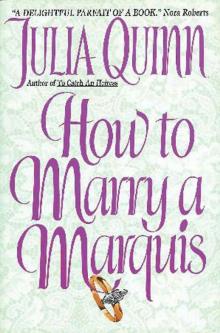 How to Marry a Marquis
How to Marry a Marquis When He Was Wicked: The 2nd Epilogue
When He Was Wicked: The 2nd Epilogue Ten Things I Love About You
Ten Things I Love About You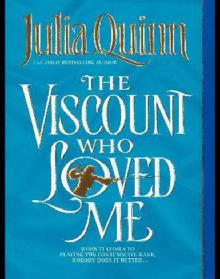 The Viscount Who Loved Me
The Viscount Who Loved Me The Duke and I
The Duke and I B05.2 To Sir Philip With Love Ep II
B05.2 To Sir Philip With Love Ep II An Offer From a Gentleman: The 2nd Epilogue
An Offer From a Gentleman: The 2nd Epilogue Minx
Minx On the Way to the Wedding with 2nd Epilogue
On the Way to the Wedding with 2nd Epilogue Mr. Cavendish, I Presume
Mr. Cavendish, I Presume A Night Like This
A Night Like This Splendid
Splendid Everything and the Moon
Everything and the Moon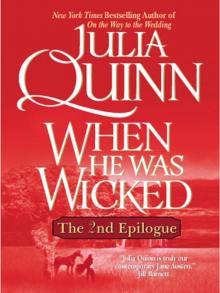 When He Was Wicked
When He Was Wicked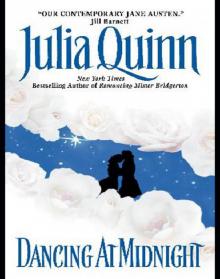 Dancing at Midnight
Dancing at Midnight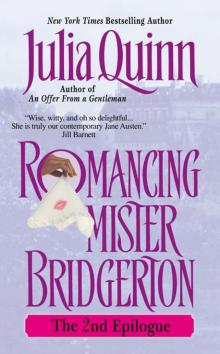 Bridgerton 04: 2nd Epilogue - Romancing Mister Bridgerton
Bridgerton 04: 2nd Epilogue - Romancing Mister Bridgerton The Lost Duke of Wyndham
The Lost Duke of Wyndham To Sir Phillip, With Love
To Sir Phillip, With Love It's in His Kiss
It's in His Kiss The Other Miss Bridgerton
The Other Miss Bridgerton Bridgerton 02: 2nd Epilogue - The Viscount Who Loved Me
Bridgerton 02: 2nd Epilogue - The Viscount Who Loved Me The Secrets of Sir Richard Kenworthy
The Secrets of Sir Richard Kenworthy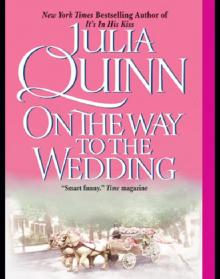 On the Way to the Wedding
On the Way to the Wedding The Secret Diaries of Miss Miranda Cheever
The Secret Diaries of Miss Miranda Cheever Because of Miss Bridgerton
Because of Miss Bridgerton What Happens in London
What Happens in London JQuinn - The Secret Diaries of Miss Miranda Cheever
JQuinn - The Secret Diaries of Miss Miranda Cheever The Girl With the Make-Believe Husband
The Girl With the Make-Believe Husband First Comes Scandal
First Comes Scandal To Catch an Heiress
To Catch an Heiress The Sum of All Kisses
The Sum of All Kisses An Offer From a Gentleman
An Offer From a Gentleman The Bridgertons: Happily Ever After
The Bridgertons: Happily Ever After Bridgerton Collection Volume 1 (Bridgertons)
Bridgerton Collection Volume 1 (Bridgertons)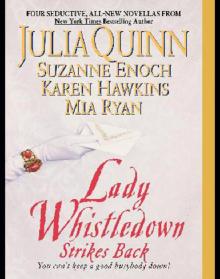 Lady Whistledown Strikes Back
Lady Whistledown Strikes Back Secret Diaries of Miss Miranda Cheever
Secret Diaries of Miss Miranda Cheever An Offer from a Gentleman with 2nd Epilogue
An Offer from a Gentleman with 2nd Epilogue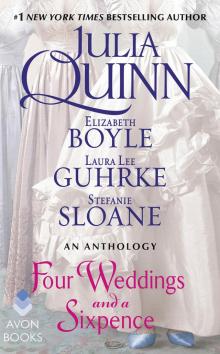 Four Weddings and a Sixpence
Four Weddings and a Sixpence An Offer from a Gentleman: The Epilogue II
An Offer from a Gentleman: The Epilogue II The Further Observations of Lady Whistledown
The Further Observations of Lady Whistledown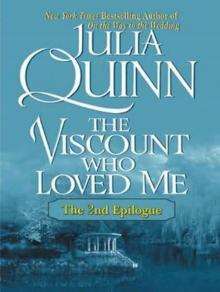 The Viscount Who Loved Me: The Epilogue II
The Viscount Who Loved Me: The Epilogue II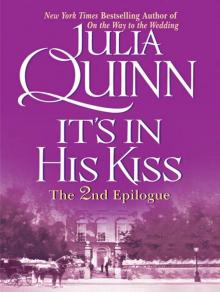 It’s In His Kiss Epilogue II
It’s In His Kiss Epilogue II To Sir Phillip, with Love: The Epilogue II
To Sir Phillip, with Love: The Epilogue II The Secret Diaries of Miss Miranda Cheevers
The Secret Diaries of Miss Miranda Cheevers A Night Like This (Smythe-Smith Quartet)
A Night Like This (Smythe-Smith Quartet) The Lady Most Likely...
The Lady Most Likely... Bridgerton 06: 2nd Epilogue - When He Was Wicked
Bridgerton 06: 2nd Epilogue - When He Was Wicked Just Like Heaven sq-1
Just Like Heaven sq-1 Gretna Greene
Gretna Greene